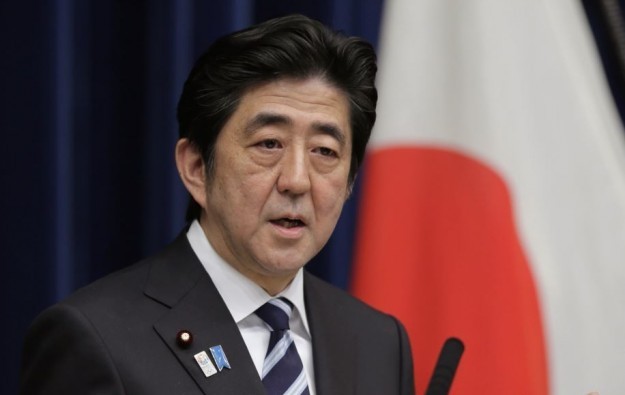Japan PM extends state of emergency to end of May
May 05, 2020 Newsdesk Japan, Latest News, Top of the deck

Japan’s Prime Minister Shinzo Abe (pictured in a file photo) has extended the nationwide state of emergency until May 31, aiming to stem new cases of Covid-19 infections in the country. In a press conference on Monday, Mr Abe pledged to gradually relax some restrictions and revise guidelines so that businesses could resume operations, even if under strict conditions to prevent the further spread of the coronavirus.
Mr Abe had first declared a state of emergency on April 7 across seven prefectures, including Tokyo, Osaka and Fukuoka. The emergency order was later expanded nationwide on April 16.
In Monday’s press briefing, Mr Abe explained that the extended state of emergency was needed for the authorities to improve the country’s “strained” healthcare system, while keeping the number of new infections low, reported several media outlets.
Under the state of emergency, people should refrain from cross-prefectural travels, as well as to go to entertainment venues, such as nightclubs or live music venues, Kyodo News agency reported. Under Japan’s emergency declaration – which is not a hard lockdown as practised in other jurisdictions – essentials shopping trips, hospital visits, walks or jogging activities are still allowed.
A fresh assessment on the situation of Covid-19 in the country will be made by a panel of medical experts around May 14, stated Mr Abe. The state of emergency order could be lifted before the newly set deadline of May 31, depending on the outcome of the medical experts’ assessment, he added.
As of Monday, there were more than 15,000 Covid-19 infection cases in Japan, according to local media reports.
While Japan hasn’t experienced the surge in cases seen in some countries, experts have warned of the risks of loosening restrictions too soon, as limited testing could make it hard to assess the scale of infections. The state of emergency enables regional governors to request businesses to close down and ask people to stay at home as much as possible.
The coronavirus pandemic has already impacted the preparation timetable process by some regions in Japan looking to host an integrated resort (IR), as large-scale casino complexes with supporting tourism facilities are known in that country.
A maximum of three casino resorts will be permitted nationally in a first phase of Japan’s gaming market liberalisation. After selecting a private-sector partner, eligible local governments will then need to apply – during the first seven months of 2021 – to the national government for the right to have such a project.
On March 27, the Osaka authorities said the submission deadline of its request-for-proposal (RFP) process had been delayed to July, instead of April. Subsequently the mayor, Ichiro Matsui, flagged that the RFP might be put back even further.
On April 15 the authorities in Japan’s Yokohama city said they were delaying by two months the respective timing for two important parts of the metropolis’ effort to get a casino resort, citing Covid-19 as a factor.
In late April Japan’s Nagasaki prefecture said it would postpone its RFP process by a “couple of months” – instead of the previously-mentioned spring time frame.
The authorities in Wakayama prefecture announced last week that only two companies had submitted application documents for its RFP process to choose a private-sector consortium as partner for its tilt to host a casino resort. Wakayama has scheduled mid-November the target date for selecting such a partner.
Related articles
-
 Japan can ease IR rules without statute...
Japan can ease IR rules without statute...Jun 13, 2024
-
 Macau mass GGR hits high in May, June...
Macau mass GGR hits high in May, June...Jun 03, 2024
More news
-
 Donaco EBITDA up y-o-y to above US$4mln...
Donaco EBITDA up y-o-y to above US$4mln...Jul 26, 2024
-
 HK listed Palasino upgrades Czech...
HK listed Palasino upgrades Czech...Jul 26, 2024
Latest News
Jul 26, 2024
Border-casino operator Donaco International Ltd has achieved a 164.17-percent year-on-year increase in its latest quarterly group earnings before interest, taxation, depreciation and amortisation...Sign up to our FREE Newsletter
 (Click here for more)
(Click here for more)
Pick of the Day
”We’ve got more traction outside of Macau at the moment. But Macau’s going be a bigger focus for us”
David Punter
Regional representative at Konami Australia
Most Popular
 Sheraton brand to exit Londoner Macao, to be Londoner Grand July 25, 2024
Sheraton brand to exit Londoner Macao, to be Londoner Grand July 25, 2024  Macau regulator probes unlicensed gaming agents July 24, 2024
Macau regulator probes unlicensed gaming agents July 24, 2024  Philippines gives 20k aliens in POGOs 60 days to leave July 25, 2024
Philippines gives 20k aliens in POGOs 60 days to leave July 25, 2024  Philippines-listed DigiPlus says not affected by POGO ban July 24, 2024
Philippines-listed DigiPlus says not affected by POGO ban July 24, 2024  Sands China 2Q EBITDA down q-o-q amid low hold, renovation July 25, 2024
Sands China 2Q EBITDA down q-o-q amid low hold, renovation July 25, 2024






